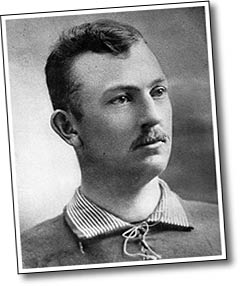|

|
| * Hall of Fame
Photo * |
Cleveland/St. Louis Spiders 1890-1900
Boston Red Sox 1901-08
Cleveland Indians 1909-11
Boston Braves 1911
Every pitcher in the
game today covets the Cy Young Award. Few, however, know much about the man whose name it bears. By today's standards Cy Young's
accomplishments are unfathomable. He won 511 games, a record that will never be approached, from 1891-1904, he averaged
just over 28 wins per season, and 749 of his 815 career starts were complete games. Numbers alone, however, only begin to
describe Cy Young's greatness - here is his story.
Denton True Young was born on March 29, 1867 in the farming community
of Gilmore, OH. He grew up as a farm boy and went by the name of Dent Young. He earned his famous nickname when trying out
for a minor league team in Canton, OH. The youngster threw so hard he was reported to be "as fast as a cyclone." He became
"Cyclone" and then simply "Cy."
Cy Young made his major league debut on August 6, 1890 with the Cleveland Spiders
of the National league. The rookie showed promise in his first season, posting a 9-7 record and a 3.47 ERA. The next season
his win total jumped to 27. In 1892 Young posted an incredible 36-12 record and a 1.93 ERA. That began a stretch of three
30 win seasons in four years. In 1899, the Spiders moved to St. Louis and their pitching ace went with them.
In 1901
the newly formed American League offered him a $600 a year raise from the National League maximum $2,400 he was currently
earning. Naturally Young accepted and was assigned to the Boston Red Sox. He responded by going 33-10 with a 1.62 ERA and
158 strikeouts, which earned him the pitcher's Triple Crown. If there would have been a Cy Young type award he would have
surely won it that season and several others.
In 1903 he led the Red Sox to the first World Series, going 28-9 with
2.08 ERA. Boston defeated Pittsburgh while Young went 2-1 with a 1.85 ERA. It would be his only World Series appearance.
Young's
arm was bionic, he pitched over 350 innings in a season 11 times, including a six year span in which he passed the 400 inning
plateau five times (1891-94, 96). He won 21 games at the ages of 40 and 41, and 19 at 42. He did all this without quality
medical care, a personal trainer, or five days rest between starts. He probably never heard of a pitch count.
Cy Young's
secret for staying healthy and pitching into his 40s, "I had a good arm and legs," he once explained. "When I would go to
spring training, I would never touch a ball for three weeks. Just would do a lot of walking and running. I never did any unnecessary
throwing. I figured the old arm had just so many throws in it, and there wasn't any use wasting them. Like for instance, I
never warmed up ten, fifteen minutes before a game like most pitchers do. I'd loosen up, three, four minutes. Five at the
outside. And I never went to the bullpen. Oh, I'd relieve, all right plenty of times, but I went right from the bench to the
box, and I'd take a few warm-up pitches and be ready. Then I had good control. I aimed to make the batter hit the ball, and
I threw as few pitches as possible. That's why I was able to work every other day."
On August 13, 1908 the Boston
Red Sox organized "Cy Young Day." For this unprecedented celebration the American League suspended all play so that an All
Star team could be formed to take on Young and the Red Sox. 20,000 fans packed the Huntington Avenue Grounds and another 10,000
reportedly had to be turned away. Young pitched the first two innings of the game and could not even give a speech because
he was so overcome with emotion.
Cy Young retired in 1911, after 22 seasons, at the age of 44. He had pitched three
no-hitters in his career including a perfect game. He remains baseball's all time leader in wins (511), loses (316), innings
(7,354+), complete games (749) and hits allowed (7092). He even saved 17 games in career, leading the league twice (1896 &
1903).
After his baseball career Young returned to rural Ohio roots to live out his days. He died in 1955 of a heart
attack at the age of 88, the next year an award was created honoring the pitcher of the year. It was named the Cy Young award,
ensuring that as long as major league baseball is played Cy Young's legacy will live on.
-David Zingler, April
2002
Young @ Baseball-Reference.com
Simply Baseball Notebook
DISCLAIMER: All pictures are assumed to be in the public domain. No violation
of copyright is intended here. If one of the photos above is not in the public domain, please notify us and it will be removed.
|

